Dec 07, 2016
Historic December cold and Lake-effect snows coming
Joseph D’Aleo, CCM, AMS Fellow
As is frequently the case, the climate models can’t forecast even a month ahead. Similar models are run 100 years into the future. We are supposed to believe they are accurate. I could name a dozen reasons why they w 814temp ill not be. They tell us they will go to faster computers and higher resolution but that simply produces higher resolution noise.
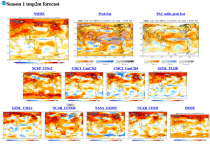
Enlarged
CPC forecasters did see some potential at the end of November for some cold in the northwest.
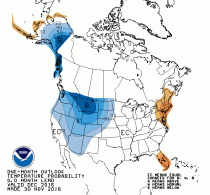
Enlarged
But WeatherBell’s statistical Pioneer model in November saw a much colder December.
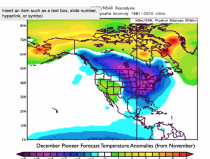
Enlarged
CPC came around to that cold mid month (they had it cold the next week) in their 8-14 day Tuesday.
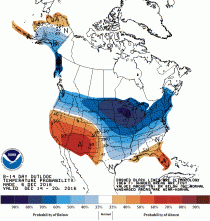
Enlarged
The models show brutal cold the next 15 days - these are anomalies of near surface temperatures in degree celsius (they show anomalies of -40F or more in the core of the cold!)
These next three maps are 5 day increments:
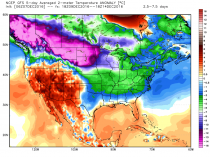
Enlarged
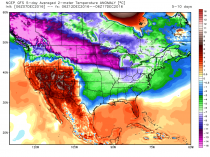
Enlarged
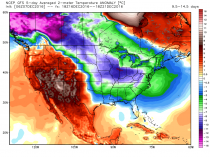 Enlarged
Enlarged
Here is what we call a Meteogram for Chicago O’Hare from the US GFS model. It shows three sub zero day with lows near -10F. The usually more accurate European model takes them to -15F!
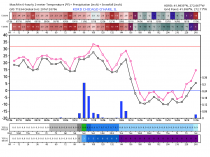
Enlarged
The many days of extreme cold crossing the warm Great Lakes will bring historic lake effect snows. Expect broadcasters and newspapers spouting the liberal lines and the AMS/GMU doctrine standing on the snowbanks and blaming it on global warming.
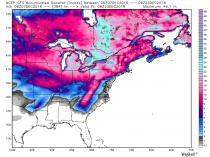
Enlarged
Here is a link to slides showing how the statistical models we use that includes factors the dynamical models ignore beat the dynamical models and official forecasts in recent years.
If you are in a weather sensitive industry, you should take a look at Weatherbell.com and follow our model, our (Joe Bastardi and I) daily blog posts and videos through this incredible stretch and winter.
Nov 17, 2016
A new morning for the environment
Anthony Sadar
As the memorable Ronald Reagan political ad announced, “It’s morning again in America.”
Hopefully, following the election of Donald Trump, a bright new day will dawn for environmental protection in the United States.
One federal agency that needs immediate attention after the swearing in of President Trump is the Environmental Protection Agency (EPA). Founded in 1970 under Republican President Richard Nixon, this powerful agency had an admirable goal to clean up the mess overtaking the nation’s air, water and land at that time. Since 1970, tremendous progress has been made on all major environmental fronts. In particular our air quality has improved 70 percent from reduction of major contaminants.
Today’s EPA is a far cry from the agency of the ‘70s. As a candidate, Mr. Trump asserted the day before the historic election government should serve the nation, not the special interests. The EPA appears to be serving the environmentalists’ special interest. And arrogant activism apparently keeps rolling along at the highest levels of the EPA.
The head of the EPA, Gina McCarthy, seems to be on shaky ground when it comes to atmospheric science. Like many others, she must have faith in climatologists. Lucky for her, the largely academic and government-supported climate scientists bolster presuppositions about the climate. These presumptions are based on an ideology, which is apparently founded on an environmentalist universalism. Such religion is rooted in years of unrelenting indoctrination in the catechism that humans are destroying the planet by living comfortably off fossil fuels.
From what appears to be a superficial, faith-based knowledge of the climate change issue, the EPA’s Ms. McCarthy has recently said, “I’m not talking to climate deniers - that’s it.” Spoken like a true believer.
It is offensive to many of us secular, knowledgeable, practicing atmospheric scientists that the top EPA official spouts denigration and demands obeisance to ecological religion. With a Trump administration, perhaps we deplorable unbelievers will have some voice to provide perspective on the complex issue of climate change, its magnitude and reasonable mitigation.
Some climate facts are well established, such as the observation that man’s activity on the local and medium scales has affected climate. Cities that replaced vegetative areas with developments show measurable increases in temperature and other long-term changes to atmospheric dynamics when compared with the surrounding countryside. The latest issue of Physics Today focuses on some climate changes related to land-surface and land-management changes.
Weather patterns can change from humans’ untoward inputs to not only landscape changes but, to a minor extent, increased loading of particulate matter and volatile organic compounds into the atmosphere. However, since draconian measures to reduce “greenhouse gases” will lead to, at best, a small fraction of a degree decrease in global temperatures, it makes more sense to focus time and talent at the EPA on further reducing toxic pollutants that pose a real threat to public health. Healthful communities will result from the feds working diligently with job-growing industries to reasonably limit harmful emissions. Command-and-control strategies from the EPA do not enrich populations if the strategies drive out business and padlock factories.
People do have some substantial, limited impact on climate. But, how serious and to what extent are questions far from being answered in any “settled science” way.
Arrogant government elites, politicians and academic scientists must shut down quality challenges to their faith in themselves, and so the EPA must be more broad-minded, opening a big tent to legitimate, informed questions regarding the entrenched idea that the climate is controlled by paltry people pollution.
Anthony J. Sadar is a certified consulting meteorologist and author of “In Global Warming We Trust: Too Big to Fail” (Stairway Press, 2016). Susan T. Cammarata is a practicing environmental and family lawyer.
----------
Energy Independence
The Trump Administration will make America energy independent. Our energy policies will make full use of our domestic energy sources, including traditional and renewable energy sources. America will unleash an energy revolution that will transform us into a net energy exporter, leading to the creation of millions of new jobs, while protecting the country’s most valuable resources - our clean air, clean water, and natural habitats. America is sitting on a treasure trove of untapped energy. In fact, America possesses more combined coal, oil, and natural gas resources than any other nation on Earth. These resources represent trillions of dollars in economic output and countless American jobs, particularly for the poorest Americans.
Rather than continuing the current path to undermine and block America’s fossil fuel producers, the Trump Administration will encourage the production of these resources by opening onshore and offshore leasing on federal lands and waters. We will streamline the permitting process for all energy projects, including the billions of dollars in projects held up by President Obama, and rescind the job-destroying executive actions under his Administration. We will end the war on coal, and rescind the coal mining lease moratorium, the excessive Interior Department stream rule, and conduct a top-down review of all anti-coal regulations issued by the Obama Administration. We will eliminate the highly invasive “Waters of the US” rule, and scrap the $5 trillion dollar Obama-Clinton Climate Action Plan and the Clean Power Plan and prevent these unilateral plans from increasing monthly electric bills by double-digits without any measurable effect on Earth’s climate. Energy is the lifeblood of modern society. It is the industry that fuels all other industries. We will lift the restrictions on American energy, and allow this wealth to pour into our communities. It’s all upside: more jobs, more revenues, more wealth, higher wages, and lower energy prices.
The Trump Administration is firmly committed to conserving our wonderful natural resources and beautiful natural habitats. America’s environmental agenda will be guided by true specialists in conservation, not those with radical political agendas. We will refocus the EPA on its core mission of ensuring clean air, and clean, safe drinking water for all Americans. It will be a future of conservation, of prosperity, and of great success.
Oct 31, 2016
Annals Of Fake, Politicized “Science”
Francis Menton
If you have never read President Dwight Eisenhower’s January 1961 farewell address, you should. It’s not long. He clearly foresaw the oncoming unchecked expansion of the federal government, and the associated dangers. The famous passage deals with the risks to science from the new-found gusher of federal grant spending:
A steadily increasing share [of scientific research] is conducted for, by, or at the direction of, the Federal government. Today, the solitary inventor, tinkering in his shop, has been overshadowed by task forces of scientists in laboratories and testing fields. In the same fashion, the free university, historically the fountainhead of free ideas and scientific discovery, has experienced a revolution in the conduct of research. Partly because of the huge costs involved, a government contract becomes virtually a substitute for intellectual curiosity… The prospect of domination of the nation’s scholars by Federal employment, project allocations, and the power of money is ever present - and is gravely to be regarded.
Fast-forward 55 years, and we are deep in the dystopia that Eisenhower foresaw. In science today, government funding is everything, and control of it empowers orthodoxy enforcement and the banishment of skeptics and dissenters—the antithesis of science. Many examples can be cited of science gone completely off the rails through the perverse incentives of government monopoly funding (see, for example, my posts on the government-backed low fat diet, here and here). But really, nothing can top the hysteria—underwritten by tens of billions of dollars of annual federal spending—of the climate change machine.
Readers here are well aware that the scientific house of cards of anthropogenic global warming becomes more unstable with each passing day. As adverse information continues to pour forth—from the Climategate emails, to the near-twenty-year unexplained “pause” in world temperature rise, to repeated revelations of alterations of historical temperature records by government functionaries trying to support the failing warming narrative—nothing slows down the federally-funded juggernaut of political climate activism and fossil fuel restriction. The most recent body blow to the catastrophic warming narrative was the Research Report from Wallace, et al., reported here last month, showing no statistically significant warming in any major world temperature time series after controlling only for concededly-non-anthropogenic El Nino and La Nina effects.
So where do our major scientific societies stand on this issue? If you don’t already know, you will be demoralized to learn that, with one notable exception, the principal societies are on record as supporting the official government narrative of dangerous human-caused global warming. In June 2016, some 31 scientific societies sent a joint letter to Congress, supposedly to “remind [it] of the scientific consensus view of climate change,” and to urge further government action to restrict fossil fuel use. You can follow the link to get the complete list of subscribing societies, and if you do, see if you can spot the big one that is missing. It’s the American Physical Society, the association of physicists! But, you ask, isn’t the so-called “science” of “climate change” a matter specifically of atmospheric physics? Turns out that the APS commissioned a review of the science of climate change by a panel of its own members in 2014, and the panel’s report failed to support the consensus “science.” A battle continues to rage on the issue at the APS (you can read more about it here) but meanwhile, the key fact is that group of people who actually know the subject matter has so many dissenters and skeptics that it hasn’t joined the bandwagon.
So who has joined the bandwagon? Well, as an example, there’s the American Society of Ichthyologists and Herpetologists. Do they know anything about climate physics? Probably not much. But they do know that if you want to study snakes and you want to go where the government money is, you will put something about global warming in your grant proposal. How about seeking a grant for “the effect of global warming on the range of the lesser eastern tree boa”? That should work!
Anyway, the issuance of the Wallace, et al., Research Report prompted me to join up with Alan Carlin, an MIT-trained economist and 40-year senior analyst and manager at EPA, to send letters last Friday to each of the 31 unscientific scientific societies demanding to know the alleged scientific basis for their position on climate change in light of the recent findings. The full text of our letter can be found here. A few key excerpts:
The June 28 Letter to which you subscribed contains statements strongly implying that there had previously been some sort of empirical validation of a quantitative causal relationship between increasing atmospheric greenhouse gas concentrations and increasing global average surface temperatures. . . . However, as noted above, the authors of the [Wallace, et al.] Research Report have been unable to find in any scientific study a rigorous empirical validation of a statistically significant quantitative relationship between rising greenhouse gas concentrations and tropical, contiguous U.S. or global temperatures. Indeed we can find no paper that actually provides mathematically rigorous empirical proof that the effect of increasing atmospheric greenhouse gas concentrations on world temperatures is different from zero with statistical significance.
As you might realize, we are concerned that prestigious scientific societies, including your own, have subscribed to a letter to Members of Congress purporting to convey scientific propositions as having been definitively established, when in fact there has never been a mathematically rigorous empirical validation of the propositions stated, and indeed there now appears to be a definitive scientific invalidation of those propositions. . . .
In short, if you have mathematically rigorous empirical validation of the hypotheses that underlie your advocacy, kindly provide it. If you do not, kindly say so.
Joseph D’Aleo (one of the co-authors of the Wallace, et al., Report) has posted the full text of our letter, along with commentary, on his excellent ICECAP website. Carlin’s treatment of the subject can be found at his CarlinEconomics website here. D’Aleo minces no words in his description of the corruption of the unscientific scientific societies:
The once professional societies continued their slide into unprecedented advocacy in recent years as they boarded the politically-driven grant gravy train and recruited to their memberships a whole generation of eco fanatics indoctrinated in our failing schools at all levels. Their advocacy with congress is not at all scientific.
Oct 27, 2016
Hillary Clinton Is No Hurricane Expert - But I Am
Dr. Neil Frank
As former Director of the National Hurricane Center (1974-1987), I was appalled when, in a campaign rally at Miami-Dade College October 11, Democratic Presidential candidate Hillary Clinton said, “Hurricane Matthew was likely more destructive because of climate change.” That is false.

We were extremely fortunate that Matthew - category 5 through much of the Caribbean - weakened to category 2 before landfall in South Carolina. It could have been much worse.
In 1893 a much stronger hurricane followed nearly the same track. When its eye reached the Georgia and South Carolina coasts, a 15-20 ft. storm surge inundated the coastal islands. Though population was a small fraction of today’s, between 2,000 and 3,000 died, making that the second deadliest hurricane in U.S. history. The same year another major hurricane killed 2,000 in Louisiana.
All together five hurricanes hit the U.S. in 1893, something that’s happened only 4 times in over 150 years (1886, 1893, 1916, 1933) - all long before CO2 levels rose enough to theoretically cause rapid global warming.
Clinton wants us to believe CO2, emitted when we burn fossil fuels for electricity and transportation vital to life, health, and prosperity, causes global warming that causes more and stronger hurricanes. She’s wrong.
There has been a worldwide 30-year lull in hurricanes, typhoons, and cyclones despite the simultaneous warming - manmade or natural. It has been 11 years since a major hurricane hit the U.S. Before that we expected, on average, 1 every 2 years. In the 7 years 1944-1950, well before the rapid rise of CO2, 6 hit Florida alone.
Clinton is ignorant about more than hurricanes. Based on computer climate models that fail test after test, predicting two to three times the observed warming, she claimed that because of rising sea level driven by manmade warming, “one in eight homes in Florida could be underwater by the end of the century.”
Empirical observation says otherwise. Since 1992 sea level in Miami has risen only a little over 1 inch - a rate of 4.2 inches per century, no faster than for millennia. Mrs. Clinton is wrong. It’s not time to move to the mountains.
Yes, Earth’s atmosphere is warming. It has been, off and on, for 150 years. What causes it? CO2, natural cycles, or some combination? Sun and ocean current cycles correlate better with global temperature than CO2.
If CO2 doesn’t control Earth’s temperature, why has our government spent some $150 billion on “green energy” alone - not to mention billions on research to bolster belief in man-made warming - over the last 15 years?
What do we have to show for it? We lost $500 million when solar panel maker Solyndra went bankrupt. In 2009 we subsidized 11 electric car companies for $2.5 billion. Six are bankrupt and 5 floundering. In 2015 Sun Edison, America’s largest “green energy” company, went bankrupt, costing us $3 billion. Abergeo, the largest international solar energy company, threatens bankruptcy costing us $2.5 billion. We’ve committed $3.5 billion toward a $100 billion climate fund for developing nations.
Projected future costs are staggering. Clinton wants to build and install 500 million new solar panels in the next four years. The Institute for Energy Research estimates this will cost $205 billion plus higher electric rates for consumers. She wants all residential energy to be “green” by 2025.
A peer-reviewed study concludes that full implementation of the Paris climate agreement, which Clinton supports, would cost $1-$2 trillion per year ($70-$144 trillion from 2030-2100). The payoff? An inconsequential 0.3F reduction in global average temperature.
If climate alarmists want to protect life, why aren’t they as concerned about the 1.5 billion people without electricity and the 2-3 billion without pure water? Millions die each year from these two factors. At a fraction of the cost of fighting global warming, electricity from abundant, affordable, reliable fossil fuels, not diffuse, expensive, intermittent wind and solar, could prevent those deaths.
Neil L. Frank, Ph.D. (Meteorology), the longest-serving Director of the National Hurricane Center (1974-1987) and retired Chief Meteorologist of KHOU-TV, Houston (1987-2008), is a Fellow of the Cornwall Alliance for the Stewardship of Creation.
Read more: http://dailycaller.com/2016/10/27/hillary-clinton-is-no-hurricane-expert-but-i-am/#ixzz4OJclPFrn
Oct 15, 2016
The Importance of the Tropical Hot Spot to EPA’s Endangerment Finding
See more on this by former EPA economist and Science analyst here and here.
Folks, I have been asked by members of a Pro Bono legal team, that has been involved for some time with CO2 regulation and the DC Circuit and Supreme Courts, to pass along to you their response to our Research Report commenters who have claimed that our proof of invalidity of the THS in real world has no bearing on the validity of EPA’s Endangerment Finding.
As the attached document makes clear, this argument is also falsified by the evidence, in this case EPA’s evidence given to the two highest courts of the land.
James P. Wallace III, Ph.D.
---------
THE IMPORTANCE OF THE TROPICAL HOT SPOT TO EPA’S ENDANGERMENT FINDING
On September 21, 2016, a new Research Report by James P. Wallace, III, John R. Christy and Joseph S. D’Aleo, On the Existence of a “Tropical Hot Spot” & The Validity of EPA’s CO2 Endangerment Finding, Abridged Research Report, was published on ICECAP. Applying statistical and econometric methods to data from the principal atmospheric temperature data sets, the Research Report claims to demonstrate that the hypothesized “Tropical Hot Spot” in the tropical upper troposphere does not exist. For the details of the analysis, consult the Report.
This so-called Tropical Hot Spot is a signature pattern of greenhouse gas warming in the tropical upper troposphere according to what EPA, the USGCRP (formerly US CCSP), and the IPCC claim is their basic physical understanding of the climate. The Tropical Hot Spot is thus fundamental to the theory of potentially catastrophic human-caused global warming.
If the Research Report is correct, it would invalidate EPA’s “Endangerment Finding” ("EF") that Greenhouse Gases ("GHGs") endanger human health and welfare, a Finding that in turn is the basis for all of EPA’s efforts to regulate CO2 emissions and the energy sector of the economy. In the EF, EPA attributes global warming to human GHG emissions based on what it calls three “lines of evidence.” The first and most important “line of evidence” is stated by EPA to be “our basic physical understanding of the effects of changing concentrations of greenhouse gases, natural factors, and other human impacts on the climate system.” See 74 Fed. Reg. 66518:3 ("attribution of observed climate change to anthropogenic activities is based on multiple lines of evidence") and 74 Fed. Reg. 66,523:2. (Link. See also Endangerment Finding Technical Support Document ("TSD"), p. 47 (listing the three lines of evidence).
But the authors of the new Research Report conclude that their findings invalidate all EPA’s three lines of evidence, not just the physical understanding. This would in turn would invalidate EPA’s attribution of warming to human emissions, and would leave the EF without support.
One of the early internet responses to the new paper has been to deprecate the importance of the Tropical Hot Spot to both the EF and to the vitality of AGW theory and modeling. See, e.g., link). The argument is that neither EPA’s “physical understanding” line of evidence nor AGW theory generally rests upon the existence of the Hot Spot.
But examination of the Endangerment Finding itself, and of its supporting documents, as well as of the assessment literature on which EPA explicitly relies, makes crystal clear that the Hot Spot is in fact a critical and necessary component of the “physical understanding” of climate that EPA claims as the foundational line of evidence supporting the EF.
For example, the “physical understanding” of the atmospheric greenhouse mechanism set forth in U.S. Climate Change Science Program, Synthesis and Assessment Product 1.1, Temperature Trends in the Lower Atmosphere - Understanding and Reconciling Differences, ("SAP 1.1"), Chapter 1, 1.1, The Thermal Structure of the Atmosphere, p. 17-19: explicitly relies upon the Hot Spot:
The sense of the radiative-convective-dynamical balance above, together with the requirement of radiative balance at the top-of-the atmosphere (namely, equilibrium conditions wherein the net solar energy absorbed by the Earth’s climate system must be balanced by the infrared radiation emitted by the Earth), can help illustrate the significance of long-lived infrared absorbing gases in the global atmosphere. The presence of such greenhouse gases (e.g., carbon dioxide, methane, nitrous oxide, halocarbons) increases the radiative heating of the surface and troposphere. As specific humidity is strongly related to temperature, it is expected to rise with surface warming (IPCC, 1990), The increased moisture content of the atmosphere amplifies the initial radiative heating due to the greenhouse gas increases (Manabe and Wetherald, 1967; Ramanathan, 1981). The re-establishment of a new thermal equilibrium in the climate system involves the communication of the added heat input to the troposphere and surface, leading to surface warming (Goody and Yung, 1989; IPCC, 1990; Lindzen and Emanuel, 2002). From the preceding discussions, the lapse rate can be expected to decrease with the resultant increase in humidity, and also to depend on the resultant changes in atmospheric circulation. In general, the lapse rate can be expected to decrease with warming such that temperature changes aloft exceed those at the surface. As a consequence, the characteristic infrared emission level of the planet is shifted to a higher altitude in the atmosphere.
(Emphasis added). The bolded text precisely describes the Hot Spot phenomenon, and clearly demonstrates that it is fundamental to the orthodox physical understanding of the greenhouse warming mechanism. The CCSP SAP 1.1 report depicted the Hot Spot graphically in figure 1.3, p. 25, as follows:
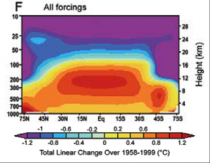
Enlarged
Similarly, the IPCC’s Fourth Assessment Report (AR4) also states unequivocally that the Hot Spot is an integral feature of the “physical understanding” of the climate’s hypothesized greenhouse warming mechanism. This is demonstrated by AR4 WG1, The Physical Science Basis, Chapter 9, Figure 9.1. Panel (c) shows the modeled effect of GHGs, and clearly depicts the hot spot:
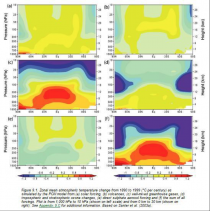
Enlarged
The text accompanying this figure explains that “The major features shown in Figure 9.1 are robust to using different climate models.” IPCC AR4 WG1 9.2.2. link). “Greenhouse gas forcing is expected to produce warming in the troposphere,...” Id.
In connection with its adoption of the EF, EPA explicitly placed primary reliance on the US CCSP reports and the IPCC AR4. See TSD Box 1.1, p 4. These assessments are cited thousands of times in the full set of documentation for the EF. EPA has well and truly bound itself to these reports.
Whether the Hot Spot exists has been a white-hot point of controversy in the climate debate for many years. The history of the controversy through 2011 is recounted in Tropospheric Temperature Trends: History Of An Ongoing Controversy, January 1, 2011. No one would care if the Hot Spot were not critically important to AGW theory and modeling.
The arguments over the Hot Spot have all been about data quality or interpretation. At no point have any of the participants said it would not matter if there were no Hot Spot, or otherwise deprecated the importance of the Hot Spot to the physical understanding of how GHGs are claimed to warm the climate.
Thus, the CCSP report cited above said if the Hot Spot were missing it would be a “potentially serious inconsistency.” Yet it ultimately sided with those claiming the mismatch between observations and prediction was not fatal. SAP 1.1, p. 11. (Emphasis added).
Given the controversy over the Hot Spot, EPA could not ignore the issue. EPA’s team, including Tom Karl, followed the lead of the CCSP (led by the same Tom Karl) and concluded there was no dispositive conflict between prediction and observation:
However, an important inconsistency may have been identified in the tropics. In the tropics, most observational data sets show more warming at the surface than in the troposphere, while almost all model simulations have larger warming aloft than at the surface (Karl et al., 2006). Karl et al. (2009) state that when uncertainties in models and observations are properly accounted for, newer observational data sets are in agreement with climate model results.
TSD p. 50 (emphasis added). To say the least, this was itself a controversial conclusion.
The New Research Report deals with this EPA’s use of models to validate the Hot Spot as follows:
Section III. Research Design
Unlike some research in this area, this research does not attempt to evaluate the existence of the THS in the real world by using the climate models. This would constitute a well-known error in mathematics and econometrics in that such climate models obviously must include all relevant theories, possibly including some not even known today; many, if not all, of which could impact Tropical temperatures.
Thus, it is never mathematically proper to attempt to validate any theory embedded in a model using the model itself. Each such theory needs to be tested outside of the model construct.
Section IV. Tropical Hot Spot Hypothesis Testing
The proper test for the existence of the THS in the real world is very simple. Are the slopes of the three trend lines (upper & lower troposphere and surface) all positive, statistically significant and do they have the proper top down rank order?
Research Report, p. 14.
In summary, both EPA and the assessments on which it relies expressly recognize the importance of the Hot Spot and treat evidence that it does not exist as a “serious” or “important” “inconsistency” between theory and observation.
The Research Report is a powerful demonstration that the Hot Spot does not exist. The significance is obvious: definitive proof there is no Hot Spot would logically invalidate the physical understanding on which the EF, AGW theory and climate models are founded. This would, in turn, invalidate the entire edifice of U.S. and international climate policy.
Contact Info: hmacdougald@cpdlawyers.com
------------
Here is what Alan Carlin thinks of the analysis and his response to questions about the methodology.
The Importance and Unique Aspects of the New Wallace et al. Report
Alan Carlin
Although the very new Wallace et al. report focuses on a new approach to showing the critical absence of a tropical hot spot, which indeed has an important inference of invalidity for USEPA’s principal “line of evidence” in their GHG Endangerment Finding, the report has even more interesting findings about other aspects of climate science. The absence of the tropical hot spot has been discussed for several years, and been ignored by climate alarmists despite the implication of this new finding that CAGW is invalid scientifically. I discussed some of these more interesting findings last week. The report provides considerable support to several of the new hypotheses highlighted here.
The importance of this new study is that the authors very carefully specified multiple simultaneous functional relationships between the most important climate science variables including the critical (in terms of alarmist science) possible dual relationships between CO2 and global temperatures and then allowed the available data to determine the importance of each variable. The report ends by asking why alarmists have apparently never used this approach to determine or assess their “science.” Most of their “science” is based on alleged relationships between the variables based on their interpretations of physical science and particularly various computer models of their creation using these interpretations (despite the inherent inability of such models to accurately portray future climate due to the chaotic nature of climate).
The Wallace et al. 2016 study represents a new and interesting approach to climate science research which should yield very interesting and much more valid results since the weight given to each likely variable is determined by available evidence rather than the guesses of carefully selected “experts” and incorporated into their largely arbitrary computer models. As Wallace et al. 2011 said:
The simplest model that can characterize the relationship between atmospheric CO2 concentration levels and temperature levels must contain at least two simultaneous equations, one for each of these two state variables. Therefore, the climate system must be analyzed using simultaneous equation estimation techniques. Otherwise the parameter estimates of any structural equations will be both biased and inconsistent, which implies they are useless for policy analysis purposes. The existence of a robust atmospheric CO2 equation has been amply demonstrated, thus guaranteeing that ANY modeling system designed to forecast temperature must include at least two equations.
The much more appropriate simultaneous equation approach used in the Wallace et al. 2016 report is notable by its apparent absence (to my knowledge) in alarmist climate science despite the contribution it could and must make if climate science is ever to have any validity.
|














